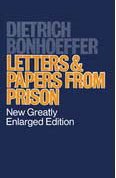Bonhoeffer
 No theologian of our century has so seriously questioned the premises of our Christian beliefs as Bonhoeffer has. And no one has dared to thrust the Church into the "world" and so honestly explored the implications of doing so, as him. And certainly no one has brought to the world a vision of Christ large enough, embracive enough, to make full-hearted involvement in the secular efforts of our time a Christian imperative. At the mere age of 39, such a light as this was extinguished, and who has there been to take his place?
No theologian of our century has so seriously questioned the premises of our Christian beliefs as Bonhoeffer has. And no one has dared to thrust the Church into the "world" and so honestly explored the implications of doing so, as him. And certainly no one has brought to the world a vision of Christ large enough, embracive enough, to make full-hearted involvement in the secular efforts of our time a Christian imperative. At the mere age of 39, such a light as this was extinguished, and who has there been to take his place?When we are reading L&PFP, we are reading fragments of incomparable genius... fragments that at one point or another were packed in tin cans and buried in the garden of Dietrich's best friend/nephew-in-law (Eberhard Bethge). Because of Bethge's own arrest in October of 1944, many letters were lost... these that survive reveal to us enough of Bonhoeffer's wrestlings with "religionless Christianity" and the "non-religious interpretation of biblical concepts" to conclude that his ideas came from no one who preceded him.
The friendship that Dietrich shared with E. Bethge was indeed profound, and as such, he speaks with him in these letters with greater intellectual depth and honesty than is evident in most of his other correspondence. At one point he even expressed the opinion that the success of any of his thought and writing depended on whether or not he would again be given the opportuinity to freely interact with Bethge. That time never came for Dietrich. On April 9, 1945 he was executed at the concentration camp at Flossenburg.
Especially poignant is the abrupt end of the contact between Dietrich and Eberhard, and the frustrated attempts of his parents and fiance to locate him. Unbeknownst to all of those closest to him, Dietrich had been transferred to Buchenwald, and one can only inadequately imagine the pain of such loss of contact. Bonhoeffer is a hero of the Christian faith, and I feel that in many ways, the reading of this book ought to be some sort of non-optional Christian event.
On February 23, 1944 he wrote: "The important thing today is that we should be able to discern from the fragment of our life how the whole was arranged and planned, and what material it consists of. For really, there are some fragments that are only worth throwing into the dustbin (even a decent 'hell' is too good for them), and others whose importance lasts for centuries, because their completion can only be a matter for God, and so they are fragments that must be fragments... If our life is but the remotest reflection of such a fragment... we will not bemoan the fragmentariness of our life, but rather rejoice in it."


0 Comments:
Post a Comment
<< Home